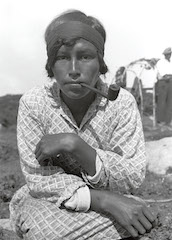Cultural Sensitivities
Mission Statement | Background | Contemporary Issues | Cultural Sensitivities | Bibliography | About Us
Home > Cultural Sensitivities
Cultural Sensitivities
Lack of cultural sensitivity can contribute to discrimination. Insensitivity may result in misnomers and labeling Indian patients as “difficult,” when an Indian patient simply wants to address his or her culture and family. Many patients agree that the quality of care received or not received by tribal members is influenced by racial discrimination or the lack of cultural sensitivity, especially by providers or employees in the private sector.
[IHS Health Administrator]: There are some biases, stigmatization, and stereotyping that goes on, especially in the private sector. There is always an assumption made [by non-Indian providers] that any illness presented by an Indian patient is alcohol-related or other forms of substance abuse. Sometimes the stereotyping is further complicated by the fact that some Indian patients lack sophistication in dealing with majority culture (JY 6/12/01).
[Tribal leader/consumer]: Private hospitals tend to place Indian patients in charity rooms or cubicles in hospitals, rarely in a room with a window, with a private bath or nice surroundings. I have accused the hospital of placing our tribal members in these ‘Indian beds,' but they denied it. I know because my husband was hospitalized a number of times at this hospital, and he was always placed in one of these ‘Indian beds' (JR 6/24/01).
Culturally competent counselors are aware of their own cultural groups and of their values, assumptions, and biases regarding other cultural groups. Moreover, culturally competent counselors strive to understand how these factors affect their ability to provide culturally effective services to clients.
Practical Advice Weaving Culture and Healthcare




